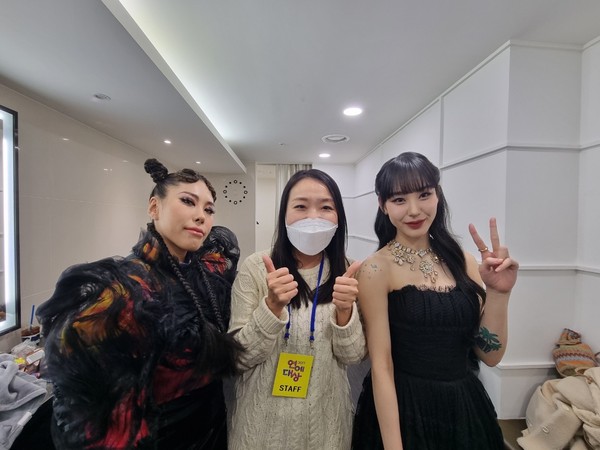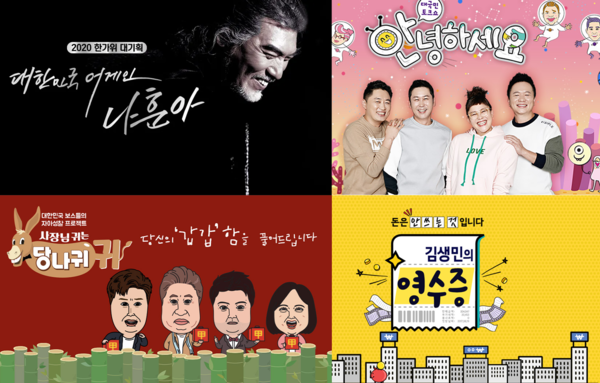
How much content do you watch a day? As media develops, it has become easier to access more diverse content in our lives. When we want to have a laugh before we finish the day, we can get it through entertainment shows. Here is a woman working behind the camera for the laughter of people. SMT met Ahn Sang-eun, who works as a producer (PD) at KBS, and learned about daily life at the broadcasting station, which is busy making TV programs.
Before we start the interview, please introduce yourself briefly.
Hello, Sookmyungians. My name is Ahn Sang-eun, and I graduated from Sookmyung Women's University's Division of Economics. I work as a producer in the entertainment department at KBS. Currently, I have been directing a program called "Boss in the Mirror" for about a year and a half.
We know that when you attended SMWU, your major was not media. What got you interested in the media? Among the many media-related jobs, was there a reason why you wanted to be a producer?
I studied economics as my major and politics as my minor. After graduating in 2007, I entered the school's press examination preparation class, 'Myungeonjae.' When I was preparing for the exam, there was no comprehensive programming channel, so I also took the newspaper exam. There was no particular reason why I decided to become a producer. I just thought it would be fun, and I thought I could do it well. Since I was young, I have liked theater and voice impressions, and I like to make people laugh by imitating others, so I thought broadcasting would be a field where I could make use of my aptitude.
Currently, the range of entertainment is gradually expanding from music programs to daily reality programs. What are the genres of entertainment programs and what are the differences between them?
Entertainment is divided into various genres, but it largely includes music shows, comedy shows, variety shows, reality shows, talk shows, and survival shows. In the case of music shows, the most important focus is to make the cast look cool. Comedy and reality are theatrical genres, and the reality genre pretends to be real but actually is not. Variety is a genre that contains not just one element, but a mixture of various ones. Survival is an audition genre that mixes elements of showmanship and reality. Talk shows have a purpose other than just talking. Each entertainment program has a more focused element, so these key elements make a difference.
All the entertainment shows you have made were popular. "Hello Counselor" and "Kim Saeng-min's Receipt" are based on the charm of everyday life. When you create a program, where do you get inspiration from?
I tend to take inspiration from humanity in people's vulnerabilities. Since I joined a broadcasting company, I have experienced various programs. As I worked, I found that I was better at forming bonds of sympathy through slips of the tongue, mistakes, and pathos rather than making people look attractive. Those things helped create the above two programs. The program "Boss in the Mirror", which I'm working on now, also has that kind of charm, and it is intriguing.
Even after deciding on the content, it takes a lot of effort behind the camera to create an entertainment show. Could you tell me how much time it takes to make a show and what kind of process is followed?
The general production process follows the order of planning, public relations, conference, shooting, editing, and broadcasting. Basically, it takes about two to three months to plan and get to the filming broadcast, but it seems to take at least two months for one program to be recognized by viewers. Recently, as the number of contents is overflowing, the public's program recognition time is getting longer. Nowadays, there are many programs that disappear despite these efforts.


The role of the cast is also important to take the program in the planned direction. Do you have any standards or methods for recruiting cast members?
I care about finding the best performer for the planning purpose. I personally prefer an MC who has experienced all sorts of hardships and is good at making the right decisions. Also, it is fun to work with the MC and someone who can feel the same things and have fun making programs. It is important to think about whom to cast, but programs are like creatures, so once it is made, it grows on its own.
As you put a lot of effort for the programs you've made, they were all loved by many people. Among all the programs, which one is the most memorable and why?
The most memorable program is "Kim Saeng-min's Receipt" because the reaction was the most sensational for all the programs I've made. Usually when a program hits, it gets a good response from the premiere, and that program was the same. Even though the program ended, I take pride in the fact that an unknown cast shot an advertisement, and a second season was commissioned.
You've worked as a producer at KBS for 14 years. What difficulties have given you the hardest time working as a PD and how did you overcome them?
Like the saying that experience is the best teacher, I have always accepted challenges. Trying something new is always scary. A useless experience sometimes embarrasses me, but I sometimes learn a lot from good experiences. At those times, I can feel that I have grown. As l became stronger, I'm no longer mad, sad, or surprised by any trials.
With the development of media, not only the number of TV shows but the number of YouTube's own content shows are increasing. Compared to the past, what are some of the changes that the expansion of media has brought to the station?
The visible change is that unlike the past, stations make YouTube-type content and distribute it through OTT. Another change is that the target audience for content is polarized between teens and the elderly. Also, because of the trend of producing programs, it is not easy to assemble a staff team these days as many of the original broadcasting staff have already joined other teams.
Nowadays, it seems that people have access to a wider variety of content through many kinds of media. What do you think is the biggest appeal that TV programs alone can offer over other media programs?
As TV has the ability to unite people, an appealing point is that if the program receives love worldwide, a producer can create content that grabs the attention of the whole country. As an example, I don't think there has been another program like "Korea Again Na Hoon-a", which I was involved in, that attracted people's attention over decades. When you have a show like that which gets close to 30 percent audience ratings, you get messages from all over the country saying things like, "I'm loving it," "I'm proud of you," and "Thank you for making a show like this." This sense of emotion and impact is part of the unique appealing point of entertainment shows too.
Ratings are often seen as a measure of a show's success. However, without caring about the ratings, what show did you feel was worthwhile while making it?
As a producer I can make a show that gets high ratings, but it's another thing to make a show that is "loved" by the entire country. To make those programs, creating attention to attract viewers is one way but I think preparing interesting and loved content seems to be a matter of luck. The programs I worked on, such as "Kim Saeng-min's Receipt," "Two Days and One Night 3: Episode of An Jung-geun," and "Korea Again Na Hoon-a" were not only entertaining but also informative. It made me feel like I had contributed to this society with my content which were proud moments.

It seems like entertainment's biggest goal is to make people laugh. As viewers have been exposed to a wide variety of entertainment programs, they are looking for an unusual laughter. Do you have any tips on making programs that arouse laughter from viewers?
Producers create 90-minute shows 52 weeks of the year. Viewers may or may not react, or they may respond and then forget about it. I think it's important to breathe with the viewer and not fluctuate between hopes and fears every time. They get used to the sensational factor and if you don't give them more, they won't find it funny. Laughter doesn't just happen; it starts from a clear intention.
Creating a program requires keen observation of what audiences want to watch and what kind of programs they like. What efforts are you making to read the rapidly changing trends?
I think experience is the most important thing. For example, I try to go to places like restaurants and neighborhoods that I haven't been to and go abroad as much as possible. Watching a lot of other content is also essential. It's quite exhausting to intentionally watch stuff that's not my taste, but as my principle is to adapt and catch change quickly, I'm trying to live by encouraging myself to change and not resting on my laurels.
Do you have any words of advice for Sookmyungians who want to join a broadcasting station and create their own programs?
There is no correct answer. No one will give it to you, so you have to take it by yourself. I recommend this field to those who want to live a fun life and enjoy change. Even if you get a 1% audience rate, if you enjoyed the process, wouldn't that be enough?
AHN SANG-EUN
- Sookmyung Women's Univ., (B.A) Division of Economics
- Joined KBS as an entertainment producer in 2009
- Produced "Hello Counselor," "Kim Saeng-min's Receipt," "Korea Again Na Hoon-a," "Immortal Song," and "Two Days and One Night 3"
- Currently directing "Boss in the Mirror"
Lee Gayun / Society Section Editor
smt_lgy@sookmyung.ac.kr
Jo Yoo Suyeon / Cub Reporter
smt.jysy@gmail.com


